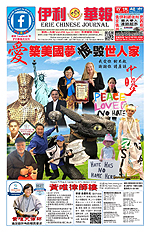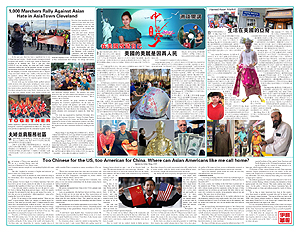|
 |
哥伦布、匹兹堡及各地消息
|
| |
Too Chinese for the US, too American for China.
Where can Asian Americans
like me call home?
|
Opinion by Selina Wang, CNN
|
Last summer, a
Chinese man approached me on a crowded Beijing street and asked me
in Mandarin if I was Chinese American. It seemed innocent enough, as
I was speaking English with expat friends.
But after I nodded, he switched to English and bellowed "go back to
where you f**king came from".
These stinging words are familiar for Asian Americans living in the
United States. But it was jarring to hear the phrase shouted at me
in China.
In the moment, I let out a laugh: As a Chinese American, I have now
been told to get out of each country for the other. It was a moment
of realization that regardless of where I go, I will always be a
foreigner.
I was born and raised in America, but over the past few years, I've
lived in Beijing, Hong Kong and now Japan -- where the majority of
people I'm surrounded by look like me and assume I'm a native. At
first, that gave me an inexplicable -- albeit superficial -- sense
of belonging that I never felt in America.
In the US, my answer to the constant question "where are you from?"
is never enough. When I say America, it's almost always followed by:
"But where are you really from?" Countless times I've been asked why
I can speak English "without an accent." And Asian American women's
experiences of racism are inextricably linked to misogyny. We've had
nearly every part of our bodies (eyes, hair, feet, mouths, skin, and
even private parts) appraised on the basis of our race. Our
personalities are assumed by strangers to be subservient.
Recently, as US-China tensions have ratcheted up, with rhetoric
from both sides turning toxic, I've also faced animosity in China
for being American. Chinese state media has fueled anti-American
nationalism, calling the US the "enemy of the world" at the height
of the US-China trade war. Meanwhile, in America, roughly nine-in-10
adults consider China a competitor or enemy, according to a Pew
survey.
"There's this consistent theme that when there are tensions with an
Asian country, people who are Asian American or who look Asian
American are often scapegoated," Christopher Lu, former Cabinet
Secretary to Barack Obama, said on CNN.
The irony is that often Asian Americans have a traumatic, complex,
or even non-existent relationship with the distant country they're
held accountable for.
This American life
My parents immigrated from China to the US for graduate studies
before I was born.
Later, my grandparents, who had been farmers in China, came to
America to help care for my sister and me. They weaved pieces of
their Chinese lifestyle into the fabric of our suburban American
home, doing what felt most familiar to them. They turned our yard
into a vegetable garden, using the produce for dumplings and other
Chinese comfort foods.
My grandparents never had the opportunity to go to school. They
taught themselves how to read and write Chinese, and proudly passed
their knowledge to their grandchildren. Chinese became my first
language.
I could barely speak English when I started pre-school. My mother
became concerned about my thick Chinese accent, so we started to
speak English more at home. From there, I only became more
self-conscious of my "Chinese-ness."
By elementary school, I asked my parents to stop packing Chinese
food for lunch. I only wanted PB&Js after getting teased for
bringing brown-colored tea eggs -- one of my favorite foods -- to
class. The other kids thought they were rotten eggs. Moments like
these made me long to be seen as the American that I am. My family,
their traditions, and those of other Asian Americans in my community
were part of the America I knew -- a melting pot of cultures.
In fact, it was China that felt foreign. During each annual summer
trip there, I felt like a tourist, and deep down, I wanted to be
treated as such. I was so proud to be an American.
But with each visit, I'd learn more about my family history and
witness China's rapid development.
First, we would visit my father's village in the countryside, and
he'd show my sister and me the mud hut he had once called home. He
would often remind us that during the Cultural Revolution, my
grandmother had to water down a single portion of porridge every day
to feed six people.
Then we would visit my mother's family in Hubei province. More than
a dozen of us would cram around a tiny table, eating bowls of sesame
noodles, while her family would recount different memories of
trauma, fraught with political persecution and suicide.
My family told stories of poverty and oppression as though they
were simple childhood memories. For my sister and me, they were
allegories with a single lesson: we should be grateful to be born in
the US -- a free, tolerant, and wealthy society. As immigrants, they
would say, upward mobility can only come by putting your head down
and outworking the rest.
Throughout the years, however, I began to notice the gap narrow
between my relatives' lives in China and mine in the US. Villagers
in my father's countryside town slowly gained electricity, running
water, cars, and phones. My cousins in the city no longer wanted
clothes from America as gifts -- they liked the styles in China
more.
In fact, there was almost no material possession we could bring
from America they couldn't already find in China. Yet as their
physical quality of life improved, their access to information
worsened, as the Chinese government tightened internet controls and
censorship.
And as the pandemic spread around the world, the news they read
differed more and more from mine.
A landmark moment
I was living in Beijing when the coronavirus outbreak began,
reporting on cases of a mysterious new pneumonia in Hubei province
in December 2019.
My cousin, a nurse, was working on the front lines at ground zero
of the pandemic near Wuhan. We stayed in contact, as she worked long
shifts without enough protective equipment, feeling the angst of
being separated from her newborn son and family. My other relatives
were under strict lockdown for months, facing pandemic-induced fear
and anxiety. The same stress we all now know.
When the pandemic reached the US, my mother called me to say she
desperately wanted to wear a mask outside. One of our close family
friends had died of Covid-19 in Wuhan early in the pandemic, and my
mother was certain the virus was far deadlier than most believed at
the time.
But she feared being discriminated against as "the Chinese lady who
has Covid-19." At the same time, my Asian American friends were
telling me they had been spat on, yelled at in the street, and even
verbally attacked in restaurants for "bringing the virus to
America."
Meanwhile, China and America engaged in a war of words over the
pandemic. Then US President Donald Trump routinely called Covid-19
the "China virus" and "kung flu", fanning racism and hatred that
fueled attacks on Asian Americans.
The Stop AAPI Hate advocacy group has tallied more than 3,795
reported incidents of hate against Asian Americans and Pacific
Islanders in the US during the pandemic, including the killings of
six women of Asian descent at Atlanta spas, which triggered rallies
across the country.
US Secretary of State Antony Blinken has said China represents
America's "biggest geopolitical test of the 21st century," as the
only country with enough power to challenge the current
international system. Meanwhile, since 2010, China has been calling
for a "new model of major-power relations."
The difficult question for America's leadership now is how to
effectively confront Beijing, without worsening discrimination at
home against people who look Chinese. That means making clear
distinctions -- for the public -- between the Chinese Communist
Party, the 1.4 billion people in China, and millions around the
world of Chinese heritage.
"For as long as Asian Americans have been in this country, we've
been treated as outsiders, as people who can't be trusted," said Lu,
the former Cabinet Secretary. "You can go all the way back to the
1800s with Chinese railroad workers, to Japanese American internment
during World War II, to the Korean and Vietnam Wars and to rising
trade tensions with Japan in the 1980s."
As I see conversations between leaders of the world's two
largest economies descend into childish bickering, I can't help but
think about all the Asian American lives uprooted or lost as a
result of geopolitical disputes that are out of their control.?
I also think about the younger me, who just wanted to be accepted as
American, and how hopeless she'd feel to know that, even today, she
would be seen as the "other" -- no matter where she goes. |
|
|
| |
|


|
| |
| |
| |
| |
| |
| |
| |
| |
| |
| |
| |
| |
| |
| |
| |
| |
| |
| |
| |
| |
| |
| |
| |
| |
| |
| |
| |
| |
| |
| |
| |
| |
| |
| |
| |
| |
| |
| |
| |
| |
| |
| |
| |
|